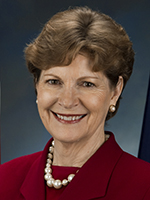Heroes on the Hill: Senators Susan Collins and Jeanne Shaheen

JDRF has seen tremendous legislative and regulatory victories in recent years on behalf of the millions of people living with type 1 diabetes (T1D). And in a political environment crowded with important issues and a strained fiscal climate, all of those victories were hard won. JDRF has its champions in Congress to thank for their work in helping to push us over the finish line. In particular, the co-chairs of the Senate and Congressional Diabetes Caucuses have spearheaded efforts that have resulted in unprecedented support among their colleagues for the T1D community. Their efforts have helped us achieve some crucial goals. These achievements bring us closer to providing better treatments, prevention, and ultimately a cure for T1D.
In this article, we focus on the Senate Diabetes Caucus co-chairs, and two of JDRF’s most committed and effective supporters: Senator Susan Collins of Maine and Senator Jeanne Shaheen of New Hampshire. These two distinguished senators—one a Republican and one a Democrat—share a passionate drive to help improve the lives of those with T1D. In service of that mission, they have made crossing party lines look just as easy as crossing the border between their two home states.
 Senator Susan Collins
Senator Susan Collins
For Senator Susan Collins, public service is practically a family business. Both her mother and father served as mayor of her hometown, Caribou, ME, and her father served Maine as a state senator. Now in her third term as U.S. senator, Ms. Collins is frequently lauded for the focus and drive she exerts in her efforts for her constituents, and also for her remarkable effectiveness. Her accomplishments are due in no small part to her proven willingness to work with her colleagues in Congress regardless of political affiliation. These qualities are perhaps best exemplified in her work on behalf of the T1D community.
Senator Collins has been an active voice for the T1D community since her first year in the Senate, as a result of meeting with people with T1D and hearing their stories. Soon after, she founded the Senate Diabetes Caucus in 1997. With now more than 40 members, both Republicans and Democrats, the Senate Diabetes Caucus is dedicated to spreading awareness about diabetes as a public health issue and providing information on legislation that could improve the lives of the millions of Americans living with the disease. Since she founded the caucus, funding for all diabetes research has grown from $319 million annually to more than $1 billion last year.
Also during her tenure, Senator Collins has enacted legislation to advance islet cell transplantation—a potentially life-changing therapeutic procedure that is an important part of JDRF’s research portfolio. On several occasions, she has helped to secure the renewal of the Special Diabetes Program (SDP), the federal program that currently provides $150 million a year for T1D research at the National Institutes of Health. And six times, she has presided over the Senate Diabetes Hearing at JDRF Children’s Congress—the organization’s flagship advocacy event for children and teenagers with T1D.
“The Special Diabetes Program has made real progress in helping us find ways to better treat, prevent, and ultimately even cure type 1 diabetes,” Senator Collins says. “While we have seen some encouraging breakthroughs in diabetes research, this is no time to take our foot off the accelerator. We will reach the finish line of finding a cure only by continuing to move forward.”
Senator Collins is joined by Senator Shaheen, who shares a mutual interest in T1D research, as a co-chair of the caucus.
 Senator Jeanne Shaheen
Senator Jeanne Shaheen
For Senator Jeanne Shaheen, T1D is a close personal issue, and advocacy is a family affair. In 2007, just one year before her election to the Senate, one of her seven grandchildren, Elle, was diagnosed with T1D during the Thanksgiving holiday. Elle was just eight years old at the time, and in the years since, Senator Shaheen and her entire family have shown unwavering support for the JDRF mission—fundraising for the Walk and Gala Programs, volunteering on their chapter board of directors, participating in clinical research, and even serving as chair family for JDRF 2011 Children’s Congress.
Senator Shaheen has taken her family’s efforts one step further, by keeping the T1D community front-and-center in the minds of her Senate colleagues. She was particularly instrumental in helping to advance the development of artificial pancreas (AP) systems at the U.S. Food and Drug Administration (FDA). Because Elle participated in a clinical trial of an artificial pancreas system in 2012, Senator Shaheen knows better than most people just how life-changing the technology can be for those living with the disease. And she has been tireless in her efforts to help JDRF accelerate the development of this technology.
Working Together
Senators Shaheen and Collins spearheaded the Senate effort in spring 2011 to encourage the FDA’s swift issuance of clear and reasonable guidance to advance the approval of AP systems. With their leadership, 59 senators signed on to a letter to FDA Commissioner Margaret Hamburg demonstrating support for the next steps in the regulatory process in the development of AP systems. Two other senators followed with their own letters of support. To further this cause, Senators Shaheen and Collins followed up with a second letter to the FDA commissioner and held a press conference to highlight the significant support within Congress and the T1D community for this critical technology.
Their persistence in this effort was met with resounding success when the FDA issued the promised draft guidance on December 1, 2011—and final guidance in November 2012. Thanks to these achievements, outpatient clinical trials of AP systems approved by the FDA are under way—bringing us one critical step closer to delivering this life-transforming technology into the hands of people with T1D.
The renewal of the SDP was JDRF’s top legislative priority in 2012. It is yet another example of Senators Shaheen’s and Collins’ steadfast dedication, and their determination to make T1D research a priority in Congress. They sent a letter to Senate Majority Leader Harry Reid and Senate Republican Leader Mitch McConnell recognizing the important contributions of the SDP. The letter included the signatures of 70 other senators—a show of bipartisan support that is particularly remarkable given the current climate of partisan gridlock. Thanks to their leadership, the SDP was renewed for another year, allowing critical research in the pipeline toward life-changing treatments and a cure for T1D to continue moving forward without interruption.
“Type 1 diabetes is a devastating condition that does not discriminate. It affects people of every age, race, and nationality,” Senator Shaheen says. “I have been proud to join with JDRF and Senator Collins to help draw attention to the fight against a condition that affects millions of Americans. While we have made progress in furthering diabetes research, there is more we can do to invest in innovative treatments and hopefully discover a cure.”
Senator Collins and Senator Shaheen have proved that partisanship is secondary when it comes to the issues that affect so many—and T1D affects us all. Each in her own way has helped give new meaning to the term “bipartisan”—and new meaning to our common goal of a world without T1D.